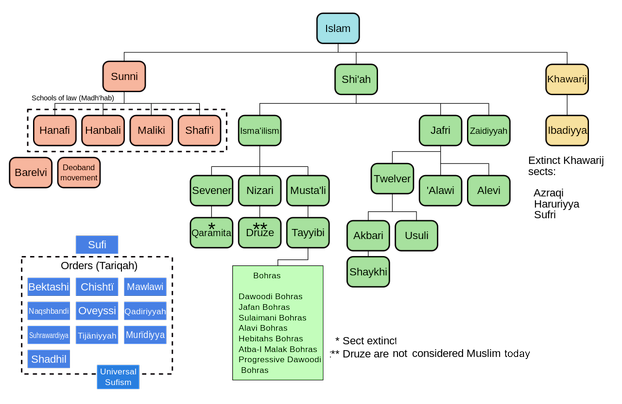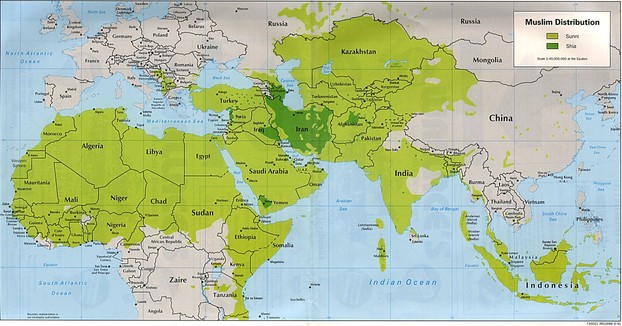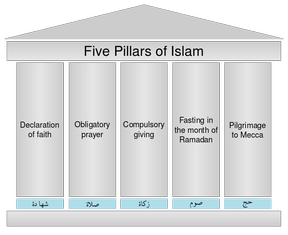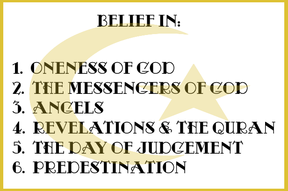A war between Islamists and all the rest of humanity is growing. It was seething for a long time, like molten lava that has not yet broken through the surface of the mountain, and has now erupted in Iraq and Syria (and to a smaller extent in Nigeria) with a blast that cannot be ignored. The waves of hate and unspeakable evil threaten to engulf societies in Western countries as well and the adherents of Islamism are not coy in their announcements of their goals.
Given that human nature leads us to simplify complex issues and turn an elaborate woven texture into a simple dichotomy of black and white, it is especially important not to paint all Moslems with the same brush. The vast majority of Moslems are NOT Islamists. They are also alarmed by the crimes that are committed supposedly in the name of Allah.
Islam is not a monolithic religion. Since much animosity among Moslems, themselves, is based upon their sectoral membership, it is important that we understand the similarities and differences among the various sects. This will help us reject the urge within ourselves to curse an entire religion because of the actions and goals of a small section of them.















 Visiting an Art Gallery With a Two-Year-Oldon 07/27/2015
Visiting an Art Gallery With a Two-Year-Oldon 07/27/2015
 Using the News to Enhance Jewish Identity in Jewish Kidson 07/24/2015
Using the News to Enhance Jewish Identity in Jewish Kidson 07/24/2015
 Xi'an - Not Just Terracotta Warriorson 06/09/2015
Xi'an - Not Just Terracotta Warriorson 06/09/2015
 Sew Your Own Wedding Dress - or Your Daughter'son 02/06/2015
Sew Your Own Wedding Dress - or Your Daughter'son 02/06/2015



Comments
Thanks, MBC. No, don't know about sects of Sufism. Complicated = interesting, no?
Very good summary. Did you know that there are about 5 or 6 sects of Sufism as well? As the saying says "it's complicated."
Thanks so much Emma. I appreciate your support for my efforts to find clarity and understanding in our complex world.
Totally agree with you, Frank.
Different paths to the same God. I half agree. There are many, but all true paths have something in common. Clearly, compassion and justice are the mark of all paths, and I think that most religions [Judaism, Christianity, Islam, Buddhism, Hinduism, Sikhism etc] are following a path to God, but are Isis following a path to God? God is not served by what they are doing.
And my thanks to you, Sandy, for letting me know that.
Thanks for explaining this. I found it very useful.
Happy you are here with me, Treathyl.
Thanks Sheri. If we were not fully convinced by our own convictions, how could we possibly go to the right or to the left and have any discussion at all? Nobody appreciate a flake who waivers all the time and can't take a stand on serious matters that are affecting everybody!! Follow me? Thanks for approving my comments for public viewing. Thank you for allowing me to be a small part of your life.
I value your contribution, cmoneyspinner. Let me add my personal view regarding what you wrote: not only do each of these faiths (and other monotheisms) claim to believe in One God, I believe they DO believe in One God and that it is the same God. People cause confusion because, in my opinion, they are not willing to accept that there may be many different paths to that same One God and they feel that everyone must accept their path as if it is the only One True Path. If we can respect each other's paths to the One God and be curious about them, I think that would bring peace. It can be a yes-and situation rather than the current no-but, if my gist is clear. And I also accept the fact that you might not agree with me about this, and that is okay too.
Thanks for adding your comment to this discussion.